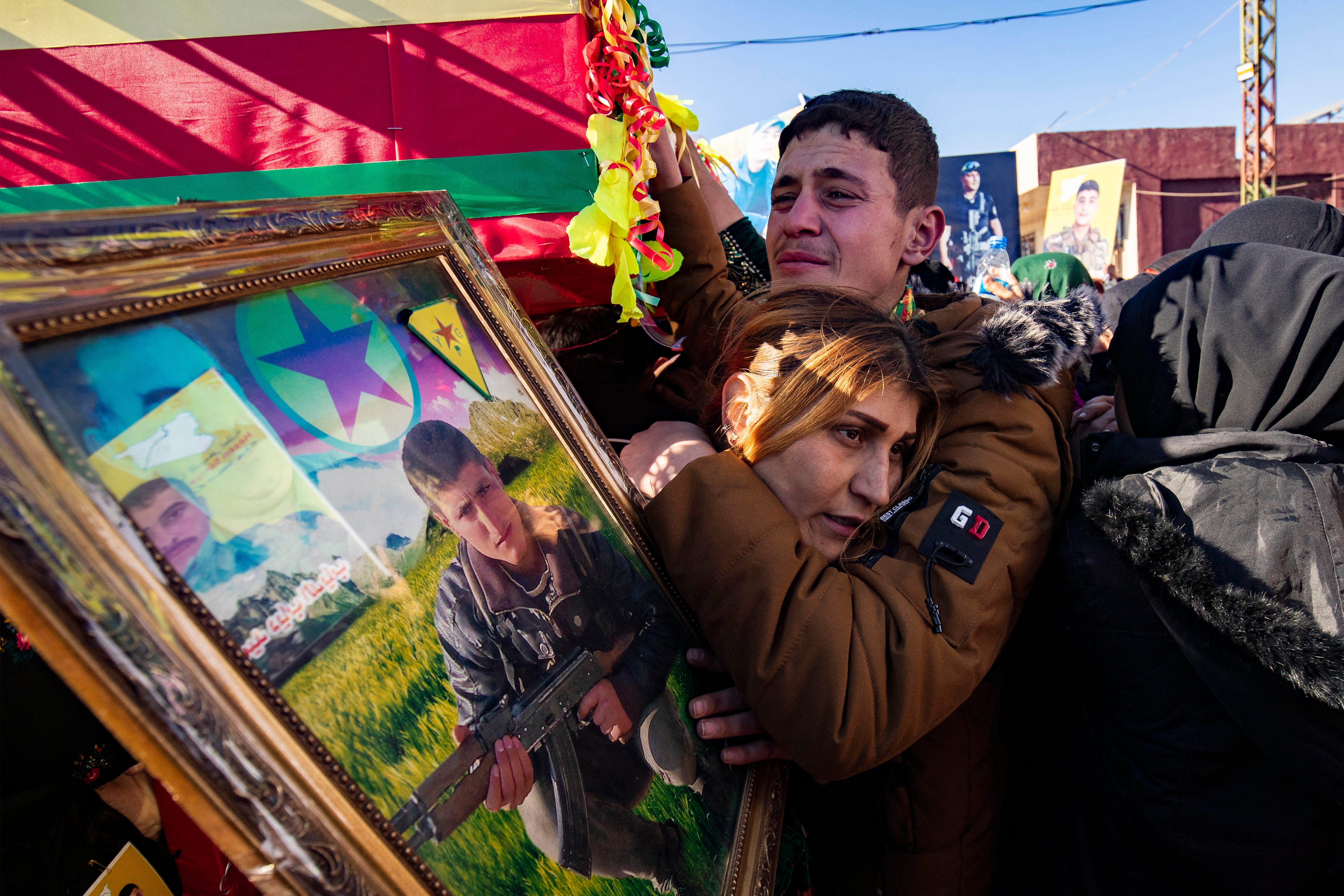Kurds in Syria Fear a New War After Fall of Assad
Amid celebrations over the end of the regime, leaders of key Kurdish groups say they fear U.S. abandonment and attacks by Turkish-backed militias
The fall of Bashar al-Assad in Syria has been a cause of celebration for opponents of his regime, including many of the country’s Kurds. During Syria’s chaotic civil war, political groups representing the historically oppressed ethnic group, whose population spans across multiple countries in the region, managed to carve out autonomous zones in Syria’s north while working closely with U.S. forces in the war against the Islamic State.
But since Assad’s fall, the future has become increasingly murky for the Kurds. Amid widespread jubilation over the collapse of the regime, militants backed by Turkey are threatening to snuff out the Kurdish experiment in self-governance and subjugate them under a new regime.
Perhaps the most feared of the Turkey-backed groups is the Syrian National Army (SNA), a coalition that includes some groups that have been accused of war crimes against Kurdish fighters and civilians during the course of the war. Videos shared in recent weeks on social media have shown executions of wounded fighters from Kurdish-led militants in hospitals in the northern Syrian city of Manbij by militants operating under the banner of SNA.
While the civil war that began in 2011 devastated much of Syria, it also allowed Kurdish political groups to assert limited autonomy in parts of the country’s north. These groups included the Syrian Democratic Forces (SDF), a U.S.-armed coalition that had been instrumental in the fight against Islamic State terrorists.

The U.S. has a major say in what could happen next with the Kurds. Thousands of SDF fighters were killed during the war against the Islamic State, where the SDF acted as the primary ground force in Syria supporting a U.S.-led air campaign to eradicate the group. With that campaign largely over, the incoming Trump administration has signalled that it might scale back its troop commitments in Syria, where around 900 U.S. soldiers remain on a mission to pursue the remnants of the Islamic State and help oversee the continued detention of tens of thousands of former fighters and their families, many of whom are being held in inhumane conditions. The SDF has been accused of using torture against these detainees, “including beatings, whipping with electrical cables, suspension from the wrists in stress positions, sexual violence, and electric shocks," according to testimonies given to human rights groups.
Turkey, which sits across the border from the independent Kurdish-led enclaves, has accused the SDF of operating as an extension of banned Kurdish separatist militant groups. In particular, Turkey has alleged that the People’s Protection Units (YPG), an armed Kurdish group operating under the aegis of the SDF, has links to a designated terrorist group known as the Kurdistan Workers’ Party (PKK) that operates inside its own territory.
“It is a bittersweet thing. Kurds are overall happy to see that Assad is gone, for all sorts of reasons. The regime was particularly oppressive towards Kurds even before the Syrian uprising, and many were even deprived Syrian citizenship,” said Mohammed Salih, a non-resident senior fellow at the Foreign Policy Research Institute’s Middle East Program.
But those fears have now been replaced by the danger of further conflict with Turkey and the SNA. During the first Trump administration, the U.S. acquiesced to a Turkish-led invasion of the Kurdish-majority Syrian city of Afrin, whose population was later targeted for reported war crimes and ethnic cleansing by SNA militias. “The big fear is the ethnic cleansing of Kurds from northeastern Syria, which is a very valid fear based on what we have seen in the past from the SNA,” Salih said.
Turkey has laid down maximalist demands to avoid a renewed conflict with Syrian Kurds. Hakan Fidan, Turkey’s foreign minister, has stated that the country’s “strategic goal is to eliminate the YPG, to get rid of it.” The country has even demanded that the group’s commanders leave Syria as part of any agreement.
Siyamand Ali, a spokesperson for the YPG, told Drop Site News that the group rejected accusations from Turkey that it coordinates activities with the PKK. “These are arguments promoted by Turkey to carry out military operations against our people. We have no relations with any party inside Turkey,” Ali said. “We hoped that the war between us and Turkey and its loyal factions would stop after the fall of the Assad regime. But unfortunately, Turkey and its loyal factions have launched a major attack on our areas.”
Syria’s Kurdish minority had long suffered under the rule of the Assad family and the Baath Party, enduring attacks on their cultural and linguistic heritage, denial of citizenship and civil rights, and forced assimilation campaigns aimed at erasing their identity entirely. Following a census in the 1960s, between 120,000 to 150,000 Syrian Kurds were stripped of their citizenship, denying them and their children basic civil rights and access to the Syrian economy.
“The Kurds in particular were very oppressed. At certain periods they couldn't even speak their language or give Kurdish names to their children. They were imprisoned,” said Kamiran Haco, an official with Syrian Kurdish National Council, an umbrella group for Kurdish organizations that had been working with other Syrian opposition groups on a new constitution prior to the fall of the Assad government. “The Baath Party regime enshrined an ideology that everyone who lives in the country is an Arab, regardless of what language they may speak,” he added.
The Kurdish experiment in self-governance over the past decade has permitted a brief cultural flourishing. Despite frequent attacks by Islamic State militants, the SNA, and Turkey itself, Kurds for the first time have been able to use their own language and live freely in areas under their control without state-mandated suppression of their ethnic identity.
Now, the fate of the Kurdish autonomous regions inside Syria and the broader question of Kurdish civil rights in the country hinges on the stance of the central government, currently run by Hayat Tahrir al-Sham (HTS). A splinter group from Al Qaeda, HTS renounced the group and its global jihadist aspirations in recent years.
So far, HTS has attempted to take a conciliatory approach towards its governance of Syria. Following HTS’s capture of Aleppo in early December, the group issued a statement denouncing past Islamic State atrocities against the Kurds, stressing that the minority group has the “right to live freely” in Syria. The group’s statement also said that diversity is “a strength of which we are proud.”
Whether HTS will live up to these promises remains to be seen. During the early stages of the Syrian uprising, Kurdish groups attempted to ally against the regime with opposition groups then operating under the banner of the Free Syrian Army, only to have that alliance collapse—due partly to the growing influence of Turkey.
Despite that unhappy history, Kurdish groups have expressed a willingness to negotiate with HTS to find an acceptable future role for themselves in a post-Assad Syria.
“We are not sure about HTS. For now, we hear some good news and hear good words, but we are a bit suspicious of what is going to happen. Good words are not enough, we have to see acts on the ground,” said Haco, of the Kurdish National Council. The council, which represents a separate political faction than the SDF, has long sought a federal system of government for Syria in which Kurds and other groups would be allocated greater political power on a decentralized basis. “But whether we achieve federalism, I believe that a new constitution will still recognize Kurds as a second ethnic group in the country, and this will be a huge step in the history of Kurds in Syria.”
In addition to federalism, Kurdish groups are also likely to demand the ability to maintain control of security in Kurdish-majority areas, some of which have been subject to attacks and ethnic cleansing in recent years by Turkish-backed militias, as well as protections under a new Syrian constitution for the Kurdish language and ethnic identity to prevent a repeat of their experiences under the Assad family. Much of Syria’s oil wealth, critical for rebuilding the country’s shattered economy, also sits in areas currently held by the SDF, which may create a bargaining chip for the group when engaging in negotiations with the new government.

The U.S. is reportedly leading an effort to reconcile different Kurdish factions in Syria in order to allow them to send a joint delegation to Damascus to negotiate their demands with HTS. The Kurdish National Council has called on the YPG to expel non-Syrian fighters from its territory and formally renounce any ties with the PKK.
“We are open to dialogue with the Damascus government and have expressed our readiness to discuss and negotiate. We must be part of building the new Syria and all components must obtain their rights in the country’s administration and move away from centralization and a single authority,” said Siyamand Ali of the YPG. “But the first condition is to stop these massacres committed by the factions loyal to Turkey against our people and the return of displaced Kurds to their original areas. The self-administration and our military forces are part of Syria and must be integrated into the new Syrian entity.”
Absent an agreement with Damascus, Syria’s autonomous Kurdish enclaves remain under physical threat. Turkish-backed militias and Turkish military commandos have reportedly massed near Kurdish-held territories in preparation for a major incursion near the Kurdish-majority city of Kobane, the site of a major battle between Kurdish groups and Islamic State fighters a decade ago.
On December 16, the Wall Street Journal published a story revealing the details of a letter sent to incoming U.S. president Donald Trump from Ilham Ahmed, an official in the Syrian Kurds’ civilian administration. Turkey, Ahmed wrote to Trump, aims with its offensive to “establish de facto control over our land before you take office, forcing you to engage with them as rulers of our territory.” Should Turkey invade, “the consequences will be catastrophic,” Ahmed added.
To ward off a possible Turkish-backed invasion, the SDF has proposed the creation of a U.S.-supervised demilitarized zone in Kobane—an idea that the Turkish government has rejected. Instead, it has called on the U.S. to sever ties with the SDF, while some U.S. lawmakers including Republican Senator Lindsey Graham and Democratic Senator Chris Van Hollen have begun threatening to impose sanctions on Turkey if militia groups under its control carry out an offensive against Kurdish-held territory.
For now, a tenuous ceasefire brokered in part by the U.S. continues to hold. But the resumption of hostilities between Kurds and other groups now threatens to embitter a brief moment of jubilation felt by many Syrians with the fall of the Assad regime.





Toss a coin to pick a faction your gonna support cause why the F#%# not; it keeps the insatiable war machine well greased killing folks somewhere forever. The vampire empire feeds on dark blood. Assad had his many faults but -the Empire- has many more. Our foreign policy is demonic. Killing Palestinians is demonic. Precipitating the Russian war with Ukraine is demonic. Death star Empire is demonic. Our Congress is demonic as is our capitalistic system of oligach rule. Why are the few in control while the majority sleeps....wake up!
Maybe African countries telling Western exploiters to 'please leave' will become a contagious thing everywhere, you know, like a gain-of-function bioweapon. ;(
May the many factions find the will to work together - for their people, instead of against each other - for empire.